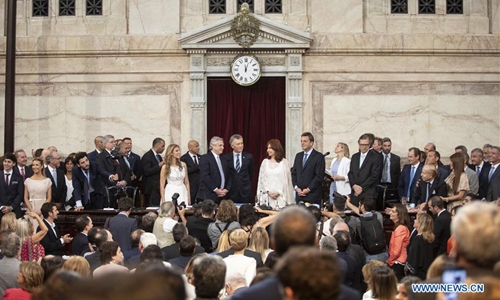HOME >> WORLD
Argentina approves urgent economic measures aimed at ending crisis
Source:AFP Published: 2019/12/24 20:23:40

Argentine President Alberto Fernandez and Vice President Cristina Fernandez attend a ceremony in Buenos Aires, Argentina, Dec. 10, 2019. Alberto Fernandez of the Everyone's Front coalition was sworn in as president of Argentina on Tuesday at a ceremony in the National Congress. (Xinhua/Martin Zabala)
Argentina's new government approved on Monday a package of emergency measures aimed at lifting the South American country out of its worst economic crisis in years.Argentina is in a recession caused by a currency collapse that struck 18 months ago.
Poverty levels in the country of 44 million still account for 40 percent - in a country that was among the world's wealthiest in the early 20th century.
The emergency economic package was announced by President Alberto Fernandez who took office two weeks ago.
The emergency measures were announced just after 5 pm in the government's Official Bulletin - several hours after it was expected due to some last-minute changes.
Fernandez's plan involves tax hikes on foreign currency purchases, agricultural exports and car sales.
The government says the tax hikes will only affect the upper and middle classes.
The bill passed the lower house of Congress on Friday and the Senate on Saturday.
Fernandez has described this crisis as almost as bad as that of 2001 - when Argentina defaulted on a $100 billion debt. Its current foreign debt stands at around 90 percent of GDP.
"It is not the same as 2001. But it is similar. At that time, poverty was at 57 percent, today we have 41 percent poor people; then we had a debt default, today we are in virtual default," Fernandez said.
The new law will allow the executive extra powers over finance, tax, administration, pensions, tariffs, energy, health and social issues.
The government's aim is to "attend to the needs of the most vulnerable sectors and to ... spark growth," said Social Security Administration chief Alejandro Vanoli.
"It's a difficult situation, it's a country that has had to restructure its debt, with a deep fiscal and financial deficit, in a situation of recession and inflation."
The government has vowed to "tackle hunger" and has announced a 10,000 ($160) peso bonus for pensioners and a six-month freeze on public utility prices.
Posted in: AMERICAS